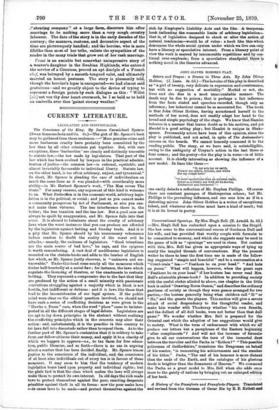JOHN OLIVER HOBBES'S PLAY.
Osbern and Ursyne : a Drama in Three Acts. By John Oliver Hobbes. (J. Lane. 3s. 61)—The heroine of this play is described as "a girl of twenty, very delicate in expression and countenance, but with no suggestion of morbidity." Morbid or not, she lives and she dies in a most unaccountable manner. The death may be due to poison ; that is perhaps a fair inference from the facts stated and speeches recorded, though only an inference; her behaviour cannot be so accounted for. The truth is that John Oliver Hobbes, having accustomed herself to the methods of her novel, does not readily adapt her hand to the broad and simple psychology of the stage. We know that Hamlet behaves in a manner that leaves doubt as to his motives, and yet Hamlet is a good acting play ; but Hamlet is unique in Shake- speare. Presumably actors have been of this opinion, since the play is published, and not acted, in spite of The Ambassador's success on the boards. We cannot honestly commend it to the reading public. The story, as we have said, is unintelligible, owing to the ambiguity of Errsyne's action in the last three or four scenes ; and the poetry—for the play is in verse—is of little account. It is chiefly interesting as showing the influence of a new model. In lines like these :— " 0. my sole joy on earth, Flower too silken, delicate, and white For my rough hold."
"0 more mysterious than an autumn night, Grave as a wintry sea with all its storms, Enchanted and entranced "—
one easily detects a reflection of Mr. Stephen Phillips. Of course there are constant passages of Shakesperian echoes; but Mr. Phillips is the prevailing influence, and one sees him as if in a distorting mirror. John Oliver Hobbes is a writer of exceptional talent, and whatever she writes must have a kind of merit; but it is at its lowest in poetry.










































 Previous page
Previous page